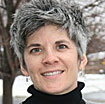Preaching is an oral/aural event.
And yet, preachers often prepare sermons as they would write term papers. The result is a sermon that comes across much like…well, a term paper.
There are a few steps that preachers can take in order to craft a sermon that is geared more toward the hearer’s ear (which really suggests that it is geared more toward the hearer…period).
First, imagine the hearers as you prepare. Literally visualize Mrs. Johnson and her family in the fourth pew on the right. Picture the Smith twins walking in and taking up residence in the back pew. See in your mind’s eye Mr. Wilson sit up tall when you begin, “Grace and peace to you…”
As you imagine your hearers in this way, jot down a few notes (perhaps in the form of prayers) about what these folks have been experiencing this past week. What might they need to hear as individuals and as a community?
Another way to prepare an aural-oriented sermon is actually to prepare the sermon orally.
Speak out loud as you sit at the computer. If you have the technology, speak it into your computer. I tend to walk through the neighborhood speaking my sermon aloud and scurry back to my computer in order to capture what I have just said. (If you do this, be prepared for phone calls inquiring about your sanity. Eventually, your neighbors will get used to this. If your neighbors are your congregation members, they will soon know the benefits of letting you meander through the streets “dialoguing” aloud with yourself.)
At different points in my sermon preparation process, I take a step back in order to ask, “If I had to preach this sermon right now, what would I say?” And then I begin to preach. If you can do this into some type of recording device in order to play back what has just been verbalized, you will be amazed to discover what is already in you.
Better yet, intentionally schedule some pastoral visits during the week which allow you both to read the next Sunday’s texts and share some of your thoughts about the forthcoming sermon. Be sure to write down what you said as you said it as soon as you get back into your car (think: CPE verbatim).

